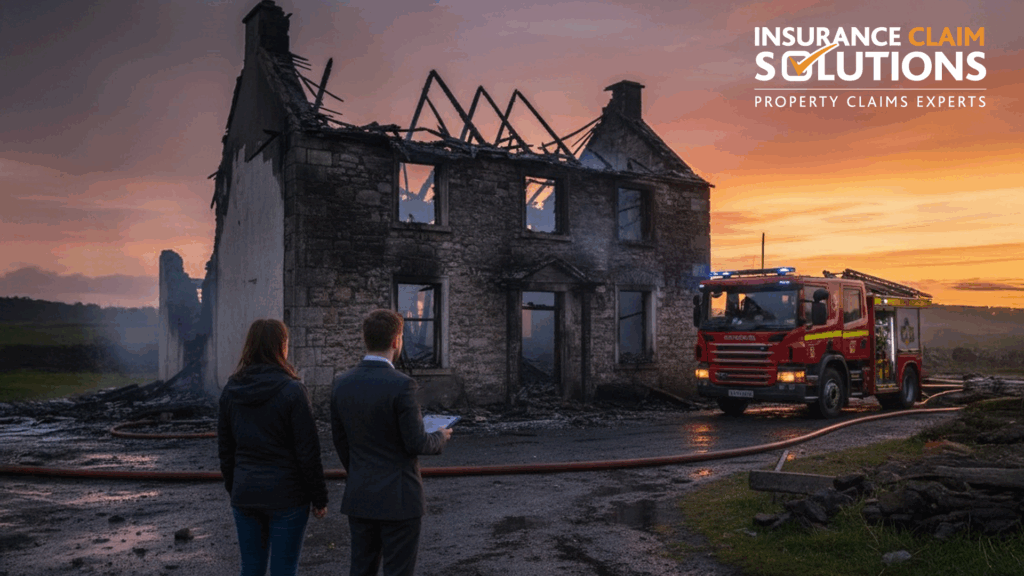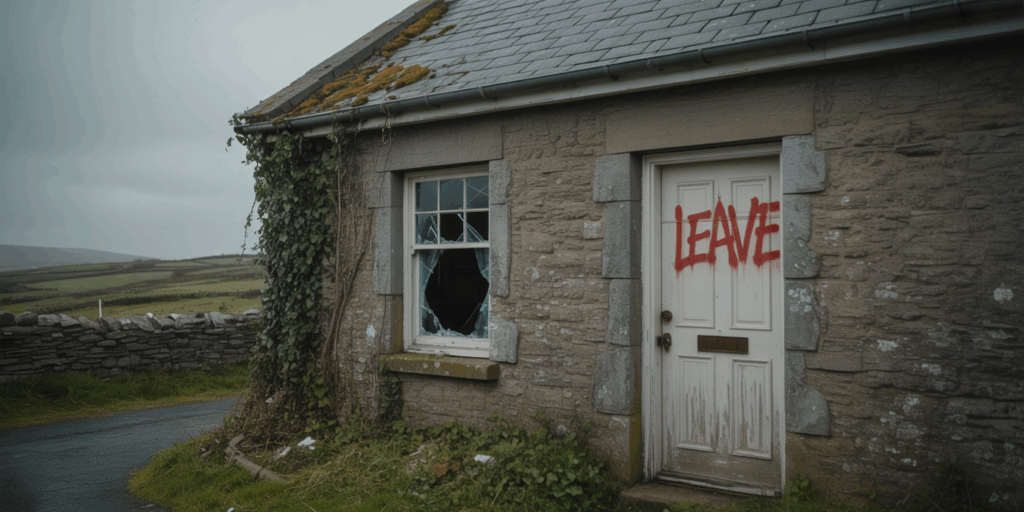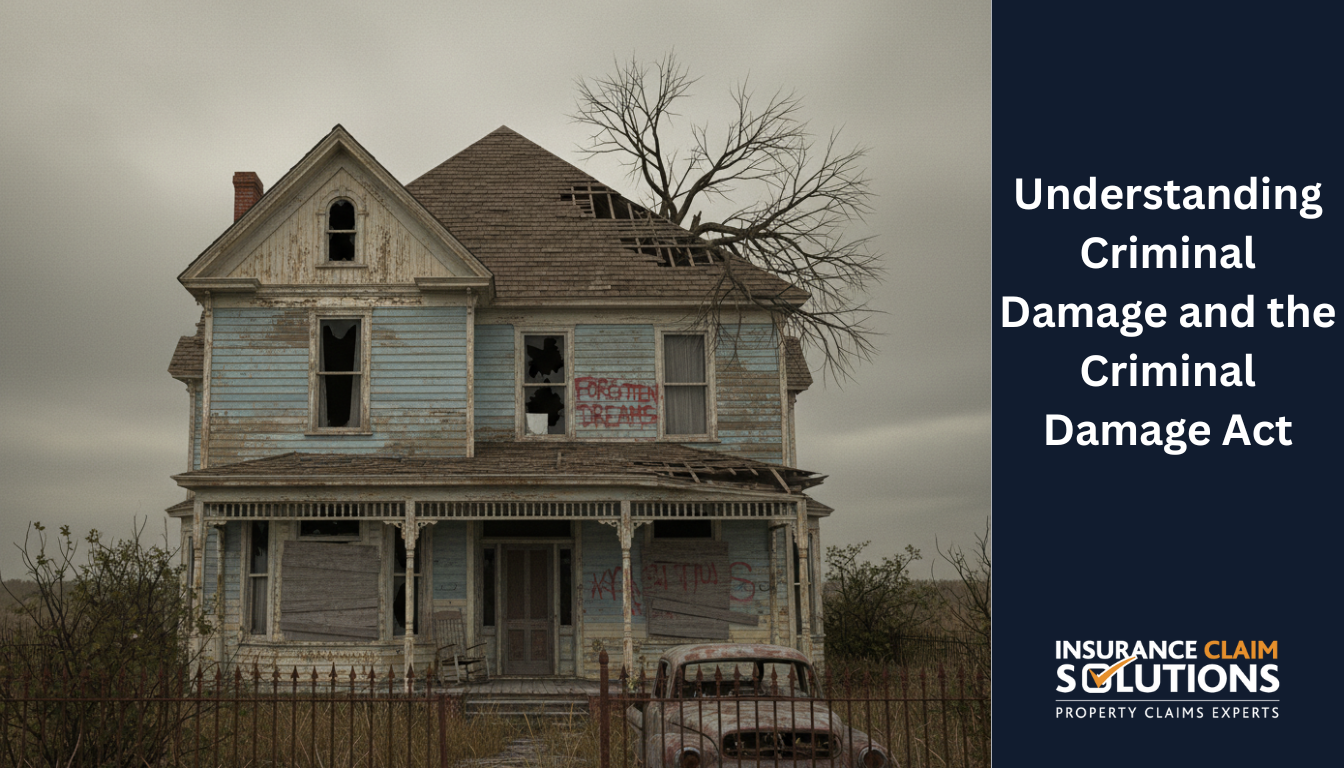Understanding Criminal Damage and the Criminal Damage Act

When someone damages your property without a lawful excuse, they’re committing an offence under the Criminal Damage Act 1991. This legislation replaced the older Malicious Damage Act and provides stronger protections for property owners facing intentional or reckless damage to property. Understanding these laws helps you recognise when criminal damage has occurred and what steps to take for both criminal prosecution and insurance recovery.
The Criminal Damage Act defines property damage broadly, covering any property of a tangible nature, including buildings, vehicles, garden structures, and personal belongings. When someone damages any property belonging to another, intending to cause harm or being reckless as to whether any property would be damaged, they face serious legal consequences, including imprisonment for a term not exceeding 10 years for serious offences.
Property Damage and Insurance Claims After Criminal Acts

Property damage resulting from criminal acts requires different handling than accidental damage claims. When dealing with malicious damage, you need evidence showing someone intended to damage any property or was reckless about causing harm. Insurance companies scrutinise these claims, particularly when there’s a dispute of title to property or questions about who has the right or interest in property.
The first 48 hours after discovering criminal damage are crucial for assessing whether any such property would require immediate attention. Report the incident to Gardaí immediately, as you’ll need a PULSE incident number for your insurance claim. Document everything before cleaning or repairing anything. Take photographs from multiple angles showing the extent of damage, any evidence of forced entry or tools used, and the overall scene as you found it. This documentation proves essential whether pursuing criminal charges or insurance compensation.
When Property Damage Becomes a Criminal Offence
Not all property damage constitutes criminal damage under the act. For someone to be guilty of an offence under this section, they must damage property without a lawful excuse, intending by the damage to cause loss. The Criminal Damage Act recognises certain defences, such as believing you had consent or acting to protect yourself or property belonging to another. However, these defences have strict limitations.
The severity of charges depends on several factors. Basic criminal damage involves damaging property belonging to another, intending harm, or being reckless. More serious charges apply when someone commits damage to endanger the life of another or commits damage with the intent to defraud. These aggravated offences carry harsher penalties, with conviction on indictment potentially resulting in imprisonment for extended periods.
Documenting Property Damage for Legal and Insurance Purposes

Whether pursuing criminal prosecution or insurance compensation, proper documentation determines your success. When you discover property damage from criminal acts, create comprehensive records immediately. List every damaged item, noting its condition, approximate value, and any identifying features. For property of a tangible nature like electronics or jewellery, record serial numbers and take close-up photographs of damage.
Your documentation should establish the timeline clearly. Note when you last saw the property undamaged, when you discovered the damage, and any suspicious activity you observed. If neighbours witnessed anything, get written statements quickly while memories remain fresh. This evidence helps Gardaí investigate and strengthen your insurance claim.
Insurance companies require specific documentation for malicious damage claims. Beyond the Garda report, they’ll want proof of ownership for damaged items, evidence of forced entry or deliberate damage, repair estimates from qualified contractors, and statements from any witnesses. The more thorough your documentation, the smoother your claim process.
Legal Proceedings Under the Criminal Damage Act

When Gardaí charge someone with criminal damage, the case proceeds through the courts based on severity. Summary conviction in the District Court handles minor offences, while serious cases involving damage that could endanger the life of another go to higher courts. As the victim, you may need to provide evidence about the damage that in fact occurred and its impact on you.
The court considers various factors when trying offences under this act, including whether any such property would have been protected under different circumstances. They examine whether the person charged with damaging property had any lawful excuse, the extent and nature of damage, whether it was targeted or random, and any previous convictions. Understanding these proceedings helps you prepare if called as a witness.
During legal proceedings, questions about title to property may arise. The law states that where title to property is involved shall preclude certain defences. Having clear documentation of ownership or right, or interest in property strengthens your position. Keep all relevant documents like deeds, receipts, or rental agreements readily available.
Insurance Considerations for Malicious Damage Claims
Insurance policies typically cover malicious damage, but the claims process differs from standard property damage claims. Insurers investigate these claims thoroughly, particularly when damage appears targeted rather than random vandalism. They’ll examine whether you took reasonable security precautions, any history of disputes that might explain targeting, and consistency between your account and evidence.
When filing your claim, be precise about the nature of criminal damage. Describe the particular kind of damage sustained and provide all supporting documentation. Insurers may send specialised investigators for malicious damage claims, especially when damage involves intent to defraud or appears connected to insurance fraud schemes.
Your policy’s terms regarding criminal damage matter significantly. Some policies exclude damage where you know the perpetrator or damage arising from domestic disputes. Review your coverage carefully and understand any limitations. If your claim involves substantial damage or complex circumstances, consider professional representation to protect your interests.
Protecting Your Property Rights After Criminal Damage

After experiencing criminal damage, protecting your property rights requires immediate action. Secure the property to prevent further damage or theft. Board broken windows, change compromised locks, and install temporary security measures as needed. Document these emergency repairs and keep receipts, as insurance typically covers reasonable mitigation costs.
Consider whether the damage affects your property’s structural integrity or safety. Damage to property that could endanger the life of another requires immediate professional assessment. Don’t attempt repairs yourself if there’s any safety concern. Get written assessments from qualified professionals documenting both immediate risks and necessary repairs.
Long-term protection involves reviewing your security arrangements. While you shouldn’t have to fortify your property, reasonable security measures may prevent future incidents and could affect future insurance premiums. Consider CCTV installation, improved lighting, or upgraded locks where appropriate.
The Criminal Justice Process and Victim Rights

As a victim of criminal damage, you have specific rights within the criminal justice system. You’re entitled to information about the investigation’s progress, notification if someone’s charged, and the opportunity to provide a victim impact statement if the case reaches court. This statement explains how the property damage affected you personally and financially.
If someone’s convicted of damaging your property, the court may order compensation alongside any criminal penalties. This compensation order requires the offender to pay for damage caused, though collection can prove challenging if they lack means. Criminal compensation doesn’t prevent you from pursuing separate civil claims for damages exceeding the criminal court’s award.
Understanding the relationship between criminal proceedings and insurance claims proves important. Insurance companies often want criminal cases concluded before finalising settlements, particularly for substantial claims. However, criminal cases can take months or years to resolve. Discuss with your insurer whether they’ll provide interim payments while criminal proceedings continue.
Practical Steps When Facing Property Damage
Need Help with Your Insurance Claim?
Expert loss assessors working exclusively for you
Contact Insurance Claim Solutions Today!
No Win – No Fee Basis
We work exclusively for you, not the insurance company
Regulated by the Central Bank of Ireland
When you discover property damage that appears intentional, follow a clear action plan. First, ensure everyone’s safety and don’t disturb the scene unnecessarily. Contact Gardaí immediately to report the criminal damage. They’ll provide an incident number essential for insurance claims. Take extensive photographs and videos before any cleanup begins.
Notify your insurance company within the timeframe specified in your policy, usually 24-48 hours. Provide factual information about the damage without speculating about causes or perpetrators. Begin documenting all damaged items, keeping a detailed inventory with descriptions, approximate values, and supporting evidence of ownership.
Secure the property against further damage or unauthorised access. Get multiple repair quotes from reputable contractors, ensuring they detail all necessary work. Keep every receipt related to the incident, from emergency repairs to additional security measures. This comprehensive approach protects both your criminal case and insurance claim interests.
Throughout this process, remember that whether someone’s guilty of an offence under the Criminal Damage Act isn’t your burden to prove for insurance purposes. Your role involves reporting accurately, documenting thoroughly, and cooperating with investigations. The legal system handles criminal culpability while insurance addresses your financial losses.
Professional support often proves valuable when dealing with complex property damage claims involving criminal acts. Loss assessors understand how insurers evaluate malicious damage claims and can ensure you receive full compensation. They handle negotiations, coordinate with investigators, and manage the extensive documentation these claims require. For significant damage or when facing claim disputes, professional representation protects your interests while you focus on recovery from this stressful experience.

